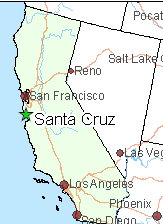
Before and after competition
The best way to guarantee service upgrades from Comcast is to threaten to launch your own competing service provider, which is precisely what worked for the community of Santa Cruz, Calif., where Comcast suddenly found the resources to upgrade the local cable system to support speeds faster than 25Mbps.
For more than two years, customers and local governments across Santa Cruz County have been begging Comcast to upgrade the cable system that would have been state-of-the-art if it was still 1997. Customers could not exceed speeds of 25-28Mbps, but Comcast continued advertising its “Performance” tier (50Mbps), Blast! (105Mbps) and even Extreme option (150Mbps), collecting dozens of extra dollars a month from customers while their broadband speeds maxed out below 30Mbps.
The cable system is so antiquated, it could not officially support consistent service above 25Mbps, and many locals complain their speeds were slower than that.
“The most popular speed in this county is 16/2Mbps, which is the fastest one Comcast will actually give you what you paid for,” said Stop the Cap! reader Jim, who lives in Santa Cruz. “It’s so bad, people are actually envious of Charter, which services customers to the south.”
 Ookla’s Net Speed Index rated the community of 62,000 447th fastest out of 505 California broadband-enabled cities.
Ookla’s Net Speed Index rated the community of 62,000 447th fastest out of 505 California broadband-enabled cities.
Comcast’s performance was so bad, a frustrated employee began leaking internal company documents exposing the fact the cable system could not deliver speeds above 29Mbps, despite marketing and advertising campaigns selling customers more expensive, faster broadband local employees knew it could not deliver.
“We’ve been complaining to the company in Philadelphia for years, asking them to stop promising something they weren’t delivering,” a Comcast technician told GoodTimes, a community newspaper. “But they ignored us.”
When customers complained, they were told their equipment was at fault or their cable modems needed to be replaced. In fact, the cable system’s local infrastructure needed to be upgraded, something Comcast has not done until recently.
 This summer, the City of Santa Cruz joined forces with Cruzio, a California-based independent Internet Service Provider, to plan a new fiber to the home network within the city.
This summer, the City of Santa Cruz joined forces with Cruzio, a California-based independent Internet Service Provider, to plan a new fiber to the home network within the city.
Under the terms of the partnership, the city will own the network, and Cruzio will act as the developer during engineering and construction and as the operator when the network is complete. Financing for the development of the network will be through city-backed municipal revenue bonds, repaid through the revenue from the sale of network services (and not by the taxpayers). The project will be financially self-sustaining and 100% of the profit generated will stay in the City of Santa Cruz.
Much of that money is likely to flow away from Comcast and into the community fiber provider, which will support speeds up to 1 gigabit. The announcement of impending competition inspired Comcast to upgrade its local cable infrastructure and the cable company suddenly announced service upgrades less than two months after the city announced their fiber project. In August, Comcast added 30 new channels, raised the speeds of two of its residential Xfinity Internet tiers at no additional cost to customers, and introduced four new tiers of Internet service for commercial business customers.
 The Performance tier speed jumped overnight from 16/2Mbps to 75/5Mbps. Blast! speed increased from 25/4Mbps to 150/10Mbps.
The Performance tier speed jumped overnight from 16/2Mbps to 75/5Mbps. Blast! speed increased from 25/4Mbps to 150/10Mbps.
For many local residents, it is too little, too late.
“Comcast can kiss me goodbye when Cruzio rolls into my neighborhood,” said Jim. “They ignored and overbilled us for years and the only time things changed is when competition was announced. Cruzio keeps their money here, Comcast sends it off to Philadelphia. If I have a problem, I know I’m going to get better service in person than dealing with Comcast’s customer service which has no idea where Santa Cruz even is.”
For Comcast customers who paid extra for Internet speeds they never received, company officials suggested they write a letter and ask for a refund, something Comcast will consider on a case-by-case basis.
“Comcast is a fundamentally deceitful company, at the leadership level,” responded local resident Charles Vaske. “They can not be trusted to stick to their word, and they certainly should not be trusted with infrastructure as vital as Internet access. A mere refund for this type of deceit is not appropriate, there should be severe penalties for such intentional crime.”


 Subscribe
Subscribe
The more serious problem here is the statement that the scammed customers can “write and ask for a refund.” Ever since forced arbitration became a regular practice, so too has the practice of scamming the customer and then playing the role of “benevolent lessor.” This is a huge problem; this very practice predicated the Great Depression. It was most prevalent following the Sherman-Truman anti-trust act of 1890. Many exceptionally large companies existed under the threat of being broken up a la Standard Oil. To combat the government, the banking industry in particular purposely sunk the American economy and subsequently bought… Read more »